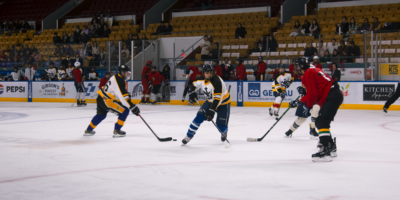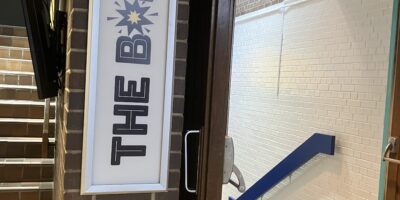Hello out there, dear reader. I’d like to begin by thanking you for reading the paper and not just doing the back page puzzles. A lot of work goes into the articles you see in the paper and it’s encouraging to know that someone is reading the content we work to publish. However, Stuart’s preparation of the crossword on the back page each term is greatly appreciated, as I’m sure I wouldn’t have the patience to find words that come together in such flawless execution.
I’d also like to thank you for reading a spring issue of the Iron Warrior. While there are almost as many engineers in the spring term as there are in the winter term, the campus feels much smaller in spring with all the people outside of co-op not around to wander the halls with the rest of us.
I’ll quickly introduce myself before rambling on like an old man about how I got to where I am. I’m a nanotechnology engineering student, on track to graduate in 2015, from the somewhat small city of Barrie, Ontario. I have a great affinity for technology and video games, with The Legend of Zelda arguably acting as one of my favourite series of all time. I used to have a strong reputation for being a heavy Nestea drinker, after I won it for free for a year and drank it after almost every meal since it cost less than water. To say this contributed to gaining my obligatory fifteen pounds at the start of my university career would not be an unfair statement.
My path to this position begins in grade 11 of high school, which is earlier than most people probably begin working towards running a university publication. My friend decided to start running a school paper, since he had wanted to apply to Harvard and, I suspect, needed something cool to put on his application to get them to consider him. I agreed to help found it and by the end of the term I was helping him with production and layout (the more technical aspects) of the newly founded Invader Updater.
The name was picked by a school-wide survey in the foyer, and I despised it for the first month before it grew on me. I set up a website and forum; the latter I shut down later that year while the former got hacked at some point. Google now flags it as a phishing site, so I suppose I can strike “make a sketchy website” off my bucket list, but if you’re interested in looking at it and are confident in your computer’s immune system, you can check out what I made back then at iu.innisdale.ca.
I tagged along as the tech guru for the club until grade 12, where I suggested becoming the Editor-in-Chief after people disliked how my friend ran the club, and I figured I was ready enough to operate it if need be. My friend had a really bizarre reaction, so I relented, but stayed on as the Managing Editor where I ran meetings, printed the paper and did all the layout, as well as harassed people for articles.
When I came to Waterloo, I attempted joining the paper but would always miss the meeting times, and it took until the second half of 1A before I finally got myself on the meeting list and to the meetings. At my first meeting, Roy assigned me with a deadly Point Counterpoint about Bruce Power, which you can go back and read in our archives (November 3, 2010; or issue 3 of fall 2010). It was quite a challenge writing a thousand words against shipping nuclear waste across the Great Lakes, and on either Friday evening or Saturday morning, Roy called me to ask me to rewrite large portions of my article after the topic was slightly altered. Needless to say, I imagine many other first time writers were not foolish enough to accept such a complex article for their debut.
In 1B, I got much more involved and began coming to Production Weekends. They were incredibly fun and gave a unique outlook on how the newspaper is produced. It was around then that I asked how people become an editor, since I’d been interested in doing it again after enjoying it so much in high school. It was then that I learned a valuable Iron Warrior lesson; those who become editors are usually those who show interest or demonstrate responsibility and dedication. I was distinctly told that by asking how to become an editor, I was likely to become an editor. In 2A, I returned to help Jon in his term and finally got going on a column. Jon indicated around the beginning of the term that I was on track to run it next, and now I’m the one who must bring in new people, make sure people have a positive impression of their experience here and want to do more for The Iron Warrior.
As a result of how the terms work out, I now get to run the spring series of issues, which brings many interesting challenges that will at the forefront of my thoughts for the remainder of my term and possibly past that. This is the first term without the five past editors who graduated in 2012, who held a strong sense of judgement and fundamental understanding of The Iron Warrior as a publication that I hope to have developed enough in myself to run the paper effectively this term. I thankfully have a few editors left who I can rely on to provide me clear judgement and instruction, and an Advisory Board who has thus far proved helpful in directing my ethical compass of what is right to publish.
Writer retention and recruitment, I would assume, have always been one of the main worries of any who held my position in the past. One of my primary mandates this term is developing the next generation of Iron Warrior editors and writers who can lead the paper boldly and efficiently.
Part of the challenge of building a strong editorial base is the bizarre cross-stream switch (or bisoctuality, as my counterpart Apple Jacks and good friend Anderson Cooper discussed with co-writer in the fall 2011 Tin Soldier) of nanotechnology students, who have built much of the editorial base since Roy’s term in fall 2010. This switching begins after the 2B term, when we go on eight-month co-ops, so I will be partaking in this scheduling as well after my term ends. While it’s great for finding jobs, it throws a wrench in much of the planning of the newspaper when your massive editor base is no longer on-stream.
Solving this problem requires more cross-stream collaboration, which is a problem in any club. There are people who are willing to write while they’re on co-op, as I did last term, which makes it easier to keep things consistent across issues. Having editors in their position for one term makes it harder to keep things consistent over time, as each editor brings their own ideas to the table and has their own ways of wanting to run the publication. The cross-stream culture and editorial board split further acts as a barrier to true cross-stream cohesiveness, and while I don’t expect this will ever be solved outright, I’d hope that my work with Farzi on the Frosh Issue will act as a good way of combining our respective stream strengths.
A benefit, however, is that many of the writers from A-Soc have now switched over to my term, so rather selfishly I get to enjoy a much wider editorial base. My fellow 2015 nanos have also offered to help out, which has been greatly appreciated and has helped me run things a little more smoothly than I was expecting to this term. Often we receive criticism for stacking our staff with 2014 and 2015 nanos, but they are the ones that most often offer to help me out, and if you reading this are not a 2014 or 2015 nano, I’d eagerly suggest to you to come to the next meeting and offer your assistance to the paper. Not only would it be great to increase the diversity of the paper, but when none of the 2014 or 2015 nanos are around when the next B-Soc Iron Warrior issues will be released, you’ll be one of the more prominent members of the paper and by starting now, will have more opportunity to learn as much as you can from people who have been here for some time.
Even if you opt not to join, I hope you enjoy reading this first issue. Note our election information in the insert on page 9, which lists profiles on all the candidates for the EngSoc executive this term. If you have any comments or questions about the paper, don’t hesistate to email, and I will do my best to respond to you promptly.




Leave a Reply